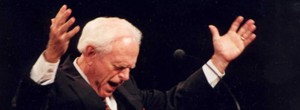The other day a man—a younger man—observed to me in conversation that I am now in my “legacy years.” Read that, if you will, as: “You’re in that stage of life where you’ve really achieved pretty much all you’re going to achieve and now it’s just about deciding how you want to exit the stage.”
Hmph. Well, thank you very much!
But there is some truth in what he says. In a mere fifteen years, should the Lord grant me that long, I’ll be 70 years old.
Not sure how that happened, but here I am. I feel great. I am in good health, thank the Lord. I dream dreams, have plans and have vision of what God will yet do. I’m not in the grave or the nursing home yet.
But still …
Earlier that same day in my personal devotions I happened to be studying Philippians 2:16: “… so that in the day of Christ I may be proud that I did not run in vain or labor in vain.”
While studying I stumbled upon this statement by a commentator from the late 1800’s: “As the Apostle advanced in years the final result of his labours would have increasing prominence in his thoughts” (H.A.A. Kennedy).
Hmmm … even the great Apostle, the longer he lived, thought more and more about what his life and labors had amounted to. What would he have to show for it all at the throne?
That says several things to me as I think about this whole “legacy” thing.
First, I note that Paul wasn’t looking back as much as he was looking forward—to the great assize at God’s throne when each will give account for what has come of the grace of God extended into their lives. Legacy is not about nostalgia. It is about accounting for grace received. On that day, what will I have to show my Savior for all He has done for and given to me?
Second, “legacy” is not about what I’ve done (and certainly not about what I’ve accumulated), but about people, about lives changed by the grace of God that have flowed through my life. To whom will I be able to point on that Day?
Third, while it is a natural thing to think about “legacy” as we grow older, it is more than that. It is a supernatural thing. As a believer it is right for me to look for signs that God has produced something through my life.
Fourth, Paul’s words approve our desire to “see” at least some measure of the fruit God bears through our lives. I agree with whoever it was that said God lets you see just enough of what He is doing through you to give you hope to carry on, but not enough to make you think you could do it without Him. For His own sovereign purposes God may send seasons when He obscures almost totally what He is producing through us. But it is permissible, even appropriate to ask God to give you some glimpse that you are on the right track and bearing fruit for Him.
So I put that together and realize that what I want to be true on that great Day had better be true of this very day. What will matter in eternity had better become all important in the moments and minutes of my life here.
People matter, relationships must be a priority. Grace and truth must be the dominant quality of those relationships. The Holy Spirit at work through me and into the individual before me at any given moment is the big thing. And being able to at least “see” something of what He is doing—this gives me hope and sustains me as I anticipate that Day in which I will stand before God’s throne and review with Him what I’ve got to show for all His mercy to me.
God is not through with any one of us. No matter your chronological age these are still the days of “far more abundantly beyond all that we ask or think” (Eph. 3:20-21). It is for that very reason that we ought regularly to sneak a peek at the approaching Day, look to the throne, and prayerfully consider what we’re going to have to show for all this.



